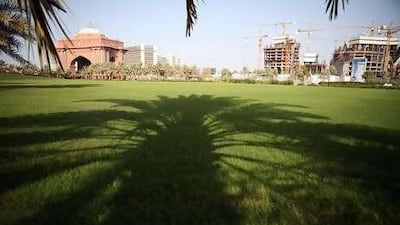Abu Dhabi // Planners want to reduce the average temperature of city streets by 5°C through innovative, but unproven and undisclosed, techniques. Summer temperatures in the capital often reach the high 40s, but the authorities developing Abu Dhabi Plan 2030 say the heat on the streets could be reduced by good planning and design. "Through the design of buildings and community infrastructure, you can actually reduce the temperature in the public realm by five degrees," said Falah al Ahbabi, general manager of the Abu Dhabi Urban Planning Council.
Excessively high temperatures, he said, were a result of how the city was planned. By narrowing downtown corridors, employing shading devices such as large-leafed trees and shade sails, and orientating streets in such a way that cool sea air is sucked in, the council says it can reduce the temperature in pedestrian areas. A recently approved plan for a mixed-use community in Dubai will use similar techniques to capture wind to cool its streets.
The first areas in which the technologies would be used are under development and include Masdar City and the planned Capital district. But designers have said some of the measures would also be used in existing districts of the city. Eight-lane roads, an excess of tall glass buildings and the vast number of cars are among the factors that create a "heat island" effect - where the temperature in the urban core is significantly higher than outside the city centre. It occurs when surface materials do not allow for evaporation and buildings block cooler breezes from entering the downtown area.
The planning council intends to remedy many of those problems, but has yet to say exactly what technologies would be used. When asked what materials it plans to use to replace the surface materials, it said: "Research and development is working to develop new sustainable materials." Under Abu Dhabi Plan 2030, high-speed rail, metro light rail, local buses, freight rail and a ferry route would be added as alternatives to motor vehicles. The council hopes the transit plan would reduce daytime traffic and further reduce street temperatures.
"All the cars everywhere adds to the problem of heat," Mr Ahbabi said. "We are heating the climate further. If there are fewer cars on the road, the temperature will decrease as well." The mixed-use areas, meanwhile, would be connected by a series of parks and green links, because plants absorb the Sun's heat and provide shade. Decreasing the proportion of tall buildings, especially those with glass facades, would also reduce the heat reflected back into the streets, the council said.
Mohammed Ibrahim, 29, who has lived in the UAE all his life, said it should be a priority to make public areas more attractive. More plants on the pavements would help accomplish that. "But I wouldn't walk more, no," he said. "Five degrees isn't much." Sitting in his black Mercedes-Benz with the driver's door open and air conditioning on, Fareed Khoori, 37, said improving the aesthetics and comfort of the city's pavements would go a long way to improve traffic congestion.
"There are so many drivers on the roads. If more people walked it would make rush hour much better," he said. "This plan is important. We need this." @Email:jhume@thenational.ae

